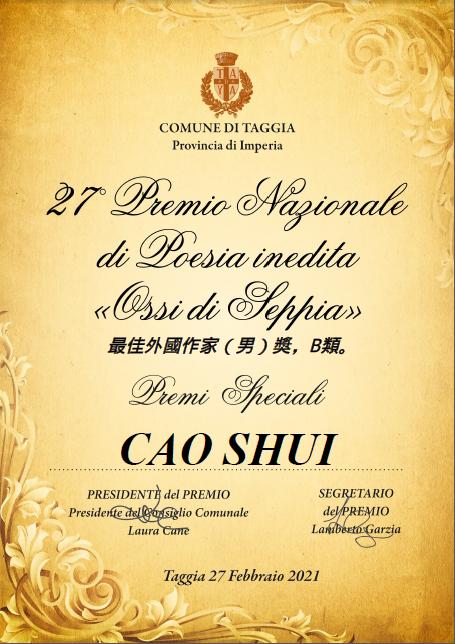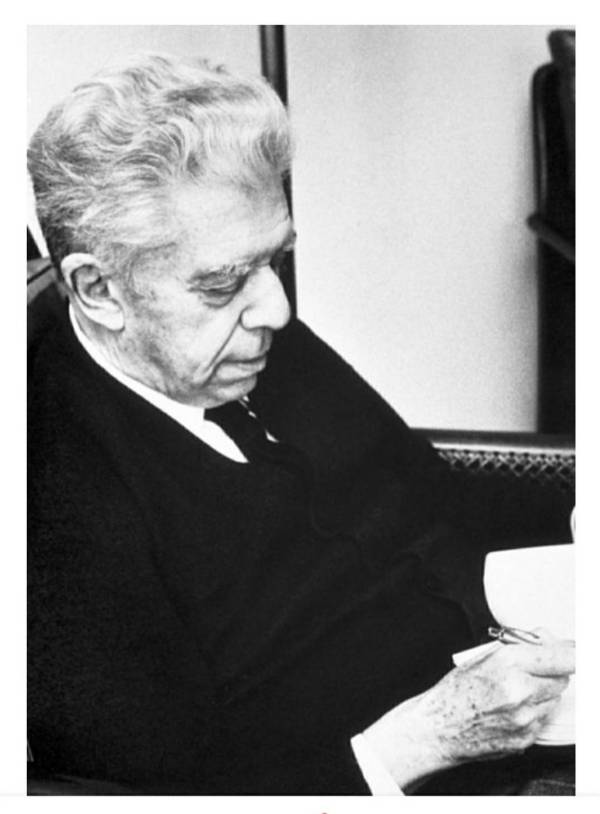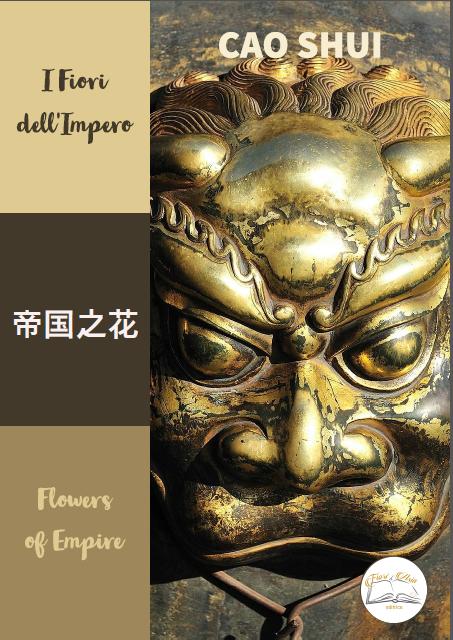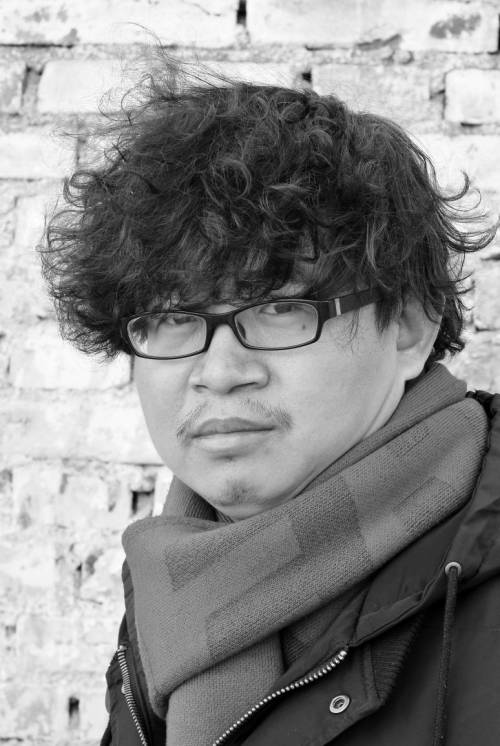
Chinese poet Cao Shui recently won the Best Foreign Writer Award of the 27th Italian "Ossi di seppia" Poetry Award. This award is named after the masterpiece "Ossi Di Seppia"(Squid Bone) by Eugenio Montale, the Nobel Prize winner for literature in 1975, and presented by the Council of Taggia in Liguria, Montale's hometown. The prize winning work is a series of poems “Forbidden Republic of World” by Cao Shui, and translated into Italian by the Swiss poet, playwright and translator Lucilla Trapazzo.
The "Ossi Di Seppia" Poetry Award is selected by the Taggia City Council of Liguria, Italy. The capital of Liguria is the famous Genoa, which is also the hometown of the Nobel Prize winner and the great Italian poet Eugenio Montale. People commemorate this great poet through the annual poetry award ceremony. Laura Cane, President of the Taggia City Council, hosted the award selecting, 8 of the winners are international poets and 8 of the winners are Italian poets. Cao Shui won the "Best Foreign Writer Award" and ranked first among foreign poets, along with Bosnian poet Emir Sokolović, Spanish poet Joan Josep Barceló i Bauçà, Chinese poet Duan Guang'an, Chinese poet Wu Touwen, Cuban poetess Aleisa Ribalta, Argentine poetess Alejandra Miranda, and Czech poetess Jana Orlová. Italian provincial award-winning poets include Alessandro Izzi Andrea tremaroli, Laura Sangermano, Camilla Tibaldo, Matteo Piergigli, Lorenzo Pataro, Alessio paiano and Niccolo Valtulini.

According to Lucilla, "Ossi Di Seppia" means Squid Bone, which is the representative work of the Italian poet Montale. This collection of poems has made the poet famous. It carefully selects a series of symbolic artistic scenes from the vast world, and focuses on depicting the subtle feelings of people's inner world. It expresses the situation that people can't wait for breath and peace in the fragmented survival. People can't maintain happiness in reality, and even can't keep a moment of memory of the past. Pain and evil are always there, eating away the world step by step, slowly and mercilessly devouring the blood and flesh of all life, leaving only a bone. In 1975, he won the Nobel Prize for literature for "because of the great artistry of his outstanding poems, he interpreted the value of human beings in a life not suitable for fantasy". English poet Sir Stephen Spender, praised Montale as "the greatest contemporary Italian poet".
Cao Shui is one of the representative poets of China's post-80s generation. In recent years, he has participated in a series of international activities such as the Medellin International Poetry Festival, the Havana International Poetry Festival in Cuba, the Kritya International Poetry Festival in India, and the International Writing Program of the Chinese Writers Association. He is a representative figure of Chinese Contemporary Literature. He leads “the Greatpoeticism” movement. In his “Manifesto of Greatpoem”, he aims to integrate sacred and secular cultures, oriental and occidental cultures, ancient and modern cultures in Chinese literature. In 2008, he resigned from a newspaper and traveled around Tibet and Xinjiang, which is the center of Eurasia or the World in his view. His novels Secret of Heaven trilogy tells the whole developing history of human civilization. His most notable works includes Epic of Eurasia, the already mentioned trilogy and King Peacock (TV series). In his works, he extracts elements of various ancient human civilizations, from Babylon to the west to Judea, Egypt, Greece, to the east to Persia, India, China, and uses these elements to reconstruct a new Utopian human homeland, which always described as Eurasia, the Top of the Tower of Babel or Kunlun Mountains (Heaven Mountains). So far twenty books of Cao Shui have been published, including five poem collections, three essay collections, ten novels, three translations and one hundred episodes TV series and films. His works have been translated into English, Italian, Spanish, French, German, Danish, Polish, Russian, Hungarian, Croatian, Slovenian, Turkish, Arabic, Japanese, Korean, Hindi, Nepali, Vietnamese, Tibetan, Mongolian, etc. He is a member of China Writers Association, China Film Association and China Poetry Society. He is also chief editor of Great Poetry, deputy editor in chief of World Poetry, secretary general of Boao International Poetry Festival and vice president of the Silk Road International Poetry Festival. Currently he lives in Beijing, and works as a professional writer and screenwriter.
Cao Shui's prize winning work, the Forbidden Republic of the World, is a reflection on the state of human isolation during the period of COVID-19. At the same time, the poem was selected by the famous poet Christopher Okemva of Kenya into Coming out of Isolation: A World Anthology of Poems on Resilience, Hope and Triumph. The poem has won high praise in the international poetry world. According to the translator Lucilla, Cao Shui's poems are embedded in 13 languages with a unique installation art structure to reflect on the living conditions of human beings and embody the new artistic power of poetry. Lucilla Trapazzo is an Italian and Swiss poet, painter, playwright, translator. She has written many works such as poetry, drama, painting and criticism. In her works, she is good at synthesizing different artistic languages. Her poems have been selected in many international anthologies, published in many literary magazines and won many awards.

Recently, Cao Shui’s poetry anthology "the Flower of Empire" has been translated by Fiori Picco, a famous Italian writer, Sinologist and publisher. This book has been published by Italian Fiori d'asia Publisher and distributed in the European Union, the United States, Japan and Latin America. Fiori is the first Italian translator to translate Cao Shui's works. In 2018, they met at the international writing program of the Chinese Writers' Association. Fiori translated his Great Dance of Sorrow and other works. They made many in-depth discussions on Chinese and Western culture, and formed a deep friendship in the process. Fiori is not only an excellent writer, but also an outstanding Sinologist. She graduated from the Chinese Department of Oriental University of Venice in Italy, and has written many novels. She has won many literature prizes. The main translated works include City Without Rain by Tie Ning, Green Village by Fan Wen, Moved by Tibet by Xiong Yuqun, Tale in the Clouds by A Lai, etc.
According to Laura Kane, President of the Taggia City Council, the 27th "Ossi Di Seppia" Poetry Award is just coming to COVID-19, so the original award ceremony may be pushed back to 2022. She hopes to bring comfort to people in the epidemic with poetry. When Fiori saw the award-winning news, she also sent congratulations, hoping that Cao Shui’s works will be more widely spread in the world. Cao Shui said that he hoped to be able to create a great poem that "integrates mysterious and secular cultures, integrates ancient and modern cultures, integrates the East and West cultures", just as Chinese great poet Hai Zi advocated "a great poem that integrates nation and human, poetry and ideal". Cao Shui quoted his poem "the Heart Grows Blue Flowers" written during the epidemic period: "as long as your faith is strong enough / the heart grows blue flowers / we wear blue flowers / dance in a lonely castle / the whole starry sky revolves around us / the whole universe gathers above our heads / there is nothing we can't do in this world". He hope that people can find "Poetic Dwelling" in the new year.

Bio of Cao Shui
Cao Shui(Chinese: 曹谁;pinyin: Cáo Shuí), also Shawn Cao (born in Jun 5, 1982), is a Chinese poet, novelist, screenwriter and translator. He is a representative figure of Chinese Contemporary Literature. He leads “the Greatpoeticism” movement. In his “Manifesto of Greatpoem”, he aims to integrate sacred and secular cultures, oriental and occidental cultures, ancient and modern cultures in Chinese literature. In 2008, he resigned from a newspaper and traveled around Tibet and Xinjiang, which is the center of Eurasia or the World in his view. His novels Secret of Heaven trilogy tells the whole developing history of human civilization. His most notable works includes Epic of Eurasia, the already mentioned trilogy and King Peacock (TV series). In his works, he extracts elements of various ancient human civilizations, from Babylon to the west to Judea, Egypt, Greece, to the east to Persia, India, China, and uses these elements to reconstruct a new Utopian human homeland, which always described as Eurasia, the Top of the Tower of Babel or Kunlun Mountains (Heaven Mountains). So far twenty books of Cao Shui have been published, including five poem collections, three essay collections, ten novels, three translations and one hundred episodes TV series and films. His works have been translated into English, Italian, Spanish, French, German, Danish, Polish, Russian, Hungarian, Croatian, Slovenian, Turkish, Arabic, Japanese, Korean, Hindi, Nepali, Vietnamese, Tibetan, Mongolian, etc. He has been invited to participate in the 30th Medellin International Poetry Festival, the 26th Havana International Poetry Festival, the 14th Kritya International Poetry Festival in India and the 4th Qinghai Lake International Poetry Festival. He is a member of China Writers Association, China Film Association and China Poetry Society. He is also chief editor of Great Poetry, deputy editor in chief of World Poetry, secretary general of Boao International Poetry Festival and vice president of the Silk Road International Poetry Festival. Currently he lives in Beijing, and works as a professional writer and screenwriter.
Click to enter the Chinese version(点击阅读中文版)